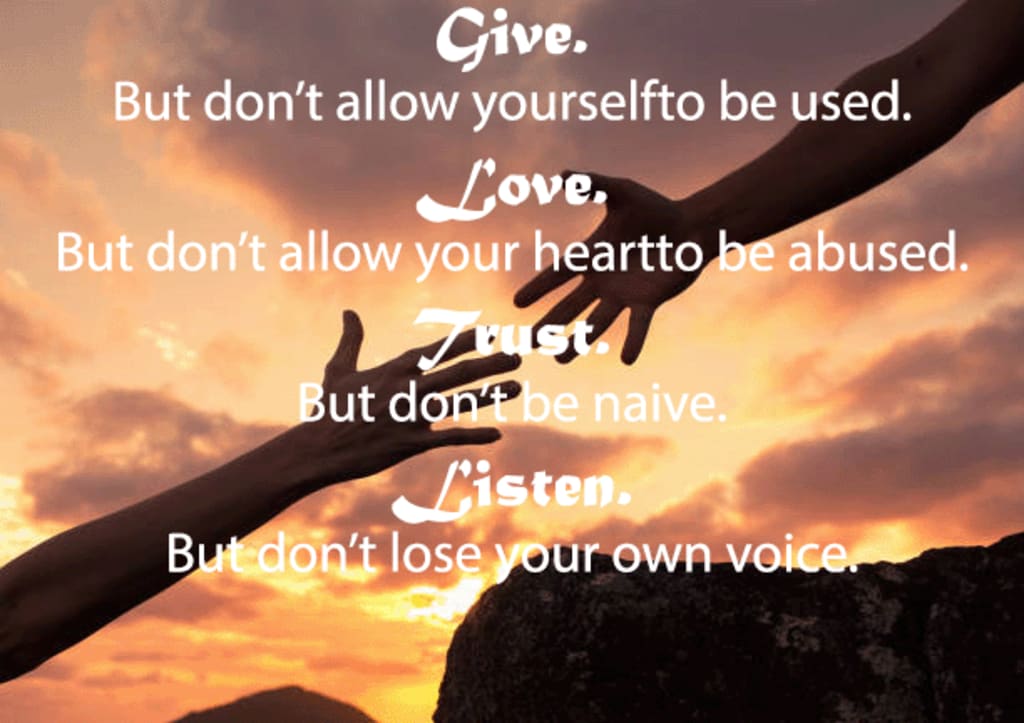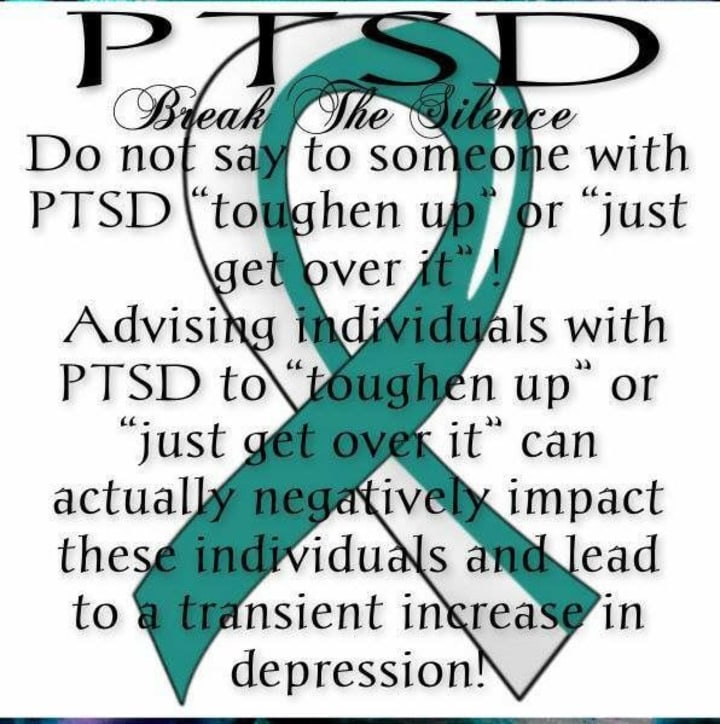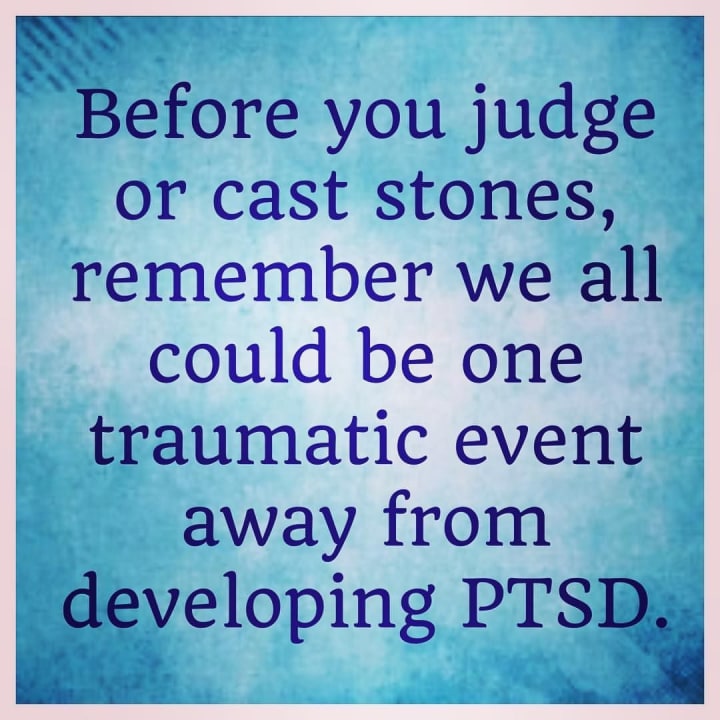How To Help Someone With PTSD
How Relationships Can Survive PTSD

have just come downstairs, and I am having a cup of coffee with my partner. Our two dogs are lying at our feet and our daughter is making herself some breakfast. I started to realise how lucky I am. I was diagnosed with PTSD about 15 years ago. Since then, I have seen the birth of my daughter, being the victim of domestic abuse, witnessed my daughter being abused and been through a divorce. Now there is peace in my family. There is only one way to describe my current partner; she is amazing.
We met about five years ago when can only describe my life as a mess and we have become a strong family. From the initial meetings, I was open to her about the PTSD and what had happened to me and she accepted it. Over the last five years, she has had to report me missing to the police, deal with changes in mood and witness behaviour that many would describe as strange.

Living with someone diagnosed with PTSD or not is tough, very tough. It will challenge the relationship to its limits. Many people in relationships with people showing symptoms of PTSD can’t cope and that is understandable. You can research PTSD, the symptoms and what it is like being with someone demonstrating theses symptoms, but it isn’t that easy. The nature of PTSD means it is a condition that is unique to the individual. You don’t catch a virus or some bug; it is the result of an incident that changed your life and is tailor-made for the individual. The symptoms are unique to the individual and can make it difficult for the people close to the individual to understand what is going on; this isn’t helped by the fact that the individual with PTSD is unlikely to want to talk about the PTSD
Below are some things to bear in mind when supporting someone with PTSD. I am not giving them as a doctor or psychologist; they are what my family, friends and I have learned from experience. Sometimes the hard way
I have spoken to my family about this, and still, it isn’t easy to explain how they have come through this. The first point may seem like a contradiction, as I have already said it isn’t a perfect fit. That is education.
Education.
Learn about PTSD, as I mentioned earlier, it isn’t a one size fits all description for PTSD, but some general symptoms occur, and it is useful to know them. For example, most if not all people suffer from flashbacks; how those flashbacks impact on the individual is another matter. When you develop communication to a point you can talk even a little, it can be good to have some background knowledge to help you start understanding the impact and why this happens. In very simple terms as a starting point, think about the individual being affected in two ways.
1. Triggers, things that take the person back to the trauma or traumas. These can happen at any time and anywhere
2. There is the everyday impact PTSD has on individuals. These are symptoms that are there all the time. They could be things like hypervigilance, avoidance etc. These aren’t necessarily triggered they are symptoms that the person experiences all the time.
Talking.
Talking may seem like the easiest this to do and you might think it is a matter of sitting down and have a chat and you can listen and you can move forward. It isn’t easy to talk about PTSD and or the traumatic event. The keyword here is to listen, you listen when they want or need to, it may be the middle of the night or suddenly when sat watching tv. The point is you need to be led by the individual. Once someone starts to talk, it is easy to start asking a question, try not to do this initially, let then say what they want to say.
The things you hear might sound crazy to you, and they might hurt. It isn’t easy to sit and hear someone saying they don’t feel any emotion and are numb. Especially if they say no one loves them and or they don’t deserve to be loved. All you can do is reassure them you do love them, and you are there for them. Just don’t get drawn into a heated discussion or even an argument. Listening and reassuring are two key elements to communicating with someone with PTSD, they may not see a problem or feel a need for treatment and you aren’t likely to be able to convince them, but by listening, reassurance and very gentle encouragement you will start moving forward.
Find someone you can share with, what is going on. It may be a good friend, doctor, a support worker or member of a support group. A problem shared is a problem halved. I remember in the police I was told it isn’t your monkey so you shouldn’t be carrying it around on your shoulder. We all take some of the problems of those closest to us on. However, you will be no use to anyone if you take everything on yourself and let it destroy you. Believe me; if you don’t do something to help yourself, it will destroy you.

Time.
You are likely to think that you do not have a lot of time. If you are at a point that you feel someone is going to harm themselves or others, you need to take immediate action. Call an ambulance or your GP. If you aren’t at that point time can be a great tool. The more you are with them and supporting them, you will build a better understanding and relationship. It will seem as if you are picking up the pieces from the latest crisis and that is tough on you. So, the other element of time is making time for yourself. Have some time where you can switch off. If they don't go to the doctor, go yourself. They may be able to put you in touch with a support group and help you when you need it.
Keep a diary.
Keeping a diary will help you understand how the PTSD affects them and help you express your thoughts. Putting it on paper will help you breakdown what is happening. Some things are obvious if someone is self-medicating on alcohol, you are likely to notice if they continually get drunk. Other things aren’t always so simple, you may find here a comment they make about keeping away from something, a balloon pops or a car backfires and there is a subtle or not so subtle reaction. Also, when you get to see a specialist, it can help to have the extra information written down. Being put on the spot can easily make your mind go blank.

Don’t Fight It.
Saying Don’t fight it, is easy to say, but can be the most difficult thing to do, or not to do. You are likely to see and hear things that you find appalling and or hurtful. I have said and done things I am ashamed of; I have caused arguments and situations that left those nearest to me hurting a lot. When PTSD takes hold of people it puts you into a fight and flight situation, people often think of fight as physical stuff, but people lash out with words and words can be as sharp as any knife. It is easy for me to sit here and say, don’t worry, they don’t mean it. I didn’t mean many things have said and done but that doesn’t mean you have to become an emotional punch bag. There are times you need to walk away, I don’t mean forever, but there are times you need to say I am not listening to this we need to take time out and come back when we both have calmed down.
Encouragement.
Many people who are encouraging someone and they interpreted as trying to push them into something, or visa-versa, someone thinks they are encouraging someone, and they are putting them under too much pressure. People with PTSD often jump to being defensive very quickly. Their life is all about protection, so it is important to keep an eye on the tightrope you are walking. One way to keep this balance is to offer encouragement when things are going well. Not just after a crisis when they have come out of the other side.
As with many of these suggestions, it all depends on the situation you and the person with PTSD find themselves in. Initially, an individual may not recognise the problem and you have to be careful about how you approach every area of life affected by the PTSD. As the person acknowledges the issue and your relationship grows, you will be able to discuss some areas more pragmatically without triggering any unwanted reaction. At times things will go wrong, something either side will say something which enflames the situation. These are the times you need to take a deep breath and start again, withdraw and you can return later. Don’t let it escalate and cause more damage.
PTSD is not the only condition that partners, family and friends are supporting. Mental Health conditions are having an impact on a growing number of individuals and those around them. I am so grateful to my family and friends. There have been casualties; during a particularly bad patch I thought of taking my life and I reached out to my son, believing he would understand. After being ignored, he said he was too busy. I never believed he would do or say that but it is how some people deal with these issues. I try not to dwell on this and look on the positive side; on the whole, I have an amazingly close family who has learned and supported me and I love them all. I have put them through hell at times but they haven’t run away or turned their back they supported me through the tough times. We all make mistakes; the important thing is how we learn from them.
About the Creator
Nic Castle
I was a U.C. Police Officer and a Community officer. After an assault on duty I was retired due to PTSD and physical injuries. I now educate people about mental health, inc PTSD conditions as well as campaigning to change UK Drug Policy.






Comments
There are no comments for this story
Be the first to respond and start the conversation.